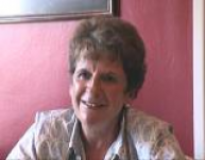Interview 39

Was admitted to intensive care in 2005 after having an accident in the home. Spent about 4 days in intensive care and 3 days in a trauma ward.
Occupation: husband - finance director, wife - housewife. Marital status: married. Number of children: 3. Ethnic background: White British.
More about me...
Her husband's moods and behaviour were hard to deal with in the first few weeks after he had come home.
Her husband's moods and behaviour were hard to deal with in the first few weeks after he had come home.
What nobody prepared me for was the fact that, we had, the first night in particular that he was home was absolutely awful. And, you know, he was almost, I mean he was sort of seeing things and hearing things and talking complete nonsense at the top of his voice, and being very physical, you know, and sort of lashing out. And no one actually had prepared me for that. And that's actually quite frightening in the middle of the night, to know how to deal with that. But he was in a very elated mood. I mean it was I'd say for the first week or ten days, and it was described to me by a doctor actually, when I talked to them about it, it's like, rather like living with somebody who'd had a drink too many. He was very disinhibited, not in a, I don't mean that in a nasty sense, but he was very exuberant and over-cheerful.
And even if he, you know, met people he didn't know, that he was sort of terribly sort of jolly. And, you know, it was very magnetic but it wasn't him. And apparently this is actually, I was told this was very much a feature of head injuries, where perhaps certain inhibitions or restraints are loosened. But it was really very much like living with somebody who'd had a drink too many.
She vividly recalled finding her husband in the garden and calling for an ambulance.
She vividly recalled finding her husband in the garden and calling for an ambulance.
It was cloudy, it was cold, and there was a hose that was running. And I suddenly realised from the colour of his clothing that he was completely drenched. And then I saw the ladder on the side, by his side. And I immediately put two and two together and realised and rushed outside. And then fortunately there was no ill effect of what I then did. Because I mean, like a lot of people, I've done a St John's Ambulance course, and you know what to do as first aid. But when you see your husband lying there, all that goes out of your head and so you immediately rush there. And then, you know, I immediately picked him up, you know, sort of off his back and cradled him. And of course that's the last thing I should have done.
Thankfully there was no, you know, permanent damage from that at all and it didn't have an impact on his rehabilitation. And of course then immediately rang the ambulance, who were here within ten to twelve minutes. And we were very fortunate.
HDU would have been better for her husband who was still very confused and weak after being in ICU.
HDU would have been better for her husband who was still very confused and weak after being in ICU.
Sadly the hospital he was in, excellent as the Intensive Care Unit was, hasn't got a High Dependency Unit. And the gulf between the nursing that he did have in the ICU and then that he subsequently had on this trauma ward was just enormous, and frankly not acceptable. Because he was still very confused. And I accompanied him to the trauma ward and it was about an hour and a quarter before a nurse came and introduced herself. It was a 6-bedded or 8-bedded ward, I can't remember, with a very challenging patient in the bed immediately next to [my husband]. A chap who clearly had a drug problem and who was behaving in a very, he was acting out quite a lot. And [my husband] was lying there totally confused and, you know, bemused by the whole thing and had no, had I not been there, wouldn't have any idea how to summon any help whatsoever. No one showed him how to use the buzzer. There was no water. So I had to be very proactive. And in fact about an hour after he'd been there was so upset about this that I marched back into the Intensive Care Unit and saw the consultant, who, you know, immediately agreed that it was not satisfactory and that this was a problem they had every time that they had to discharge somebody from the Intensive Care unit. But for some reason this wasn't a target in this health authority, although they recognised that an HDU was absolutely crucial.
So [your husband] had to continue staying in the trauma ward?
Yes. What they did do was, they have an outreach team, which is frankly not very adequate. But, you know, so once a day the outreach team would come and see him to check that, how he was getting on. It was the best they could do clearly, but certainly didn't take the place of a High Dependency Unit, which is where he should have been.
What did the outreach team actually do? Was it just a conversation?
A conversation basically, and just sort of I suppose monitoring that he was, you know, having his, you know, the right sort of checks being, sort of being made by the nursing staff. The nurse who was in charge of him was also challenged by, you know, linguistic abilities. She was very caring but her English wasn't excellent. So all in all that wasn't ideal.

